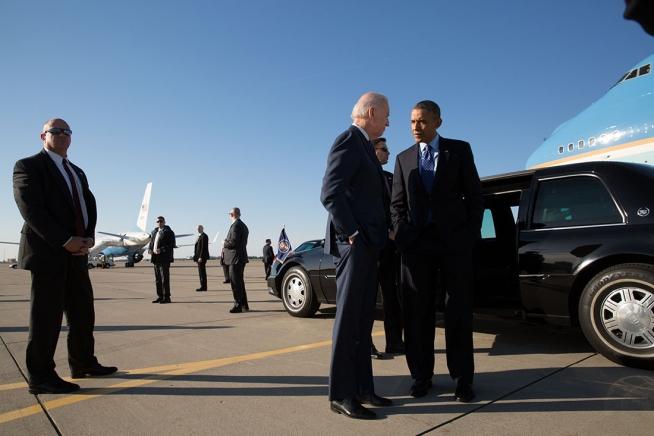Australia in the age of an introspective United States?
Posted By Rod Lyon on May 5, 2014 @ 14:30
[1]President Obama’s recent Asian tour, although successful, has done little to dilute the questioning of his global leadership style. A [2]New York Times editorial [2] on the weekend concluded that the president’s foreign policy isn’t as bad as his critics claim, but ‘just not good enough’. And Obama’s recent defence of his foreign policy [3] leaves no doubt that a rebalancing of US global engagement is underway. Obama criticises those who would involve the American people in a further set of wars they don’t want—a clear sign that domestic priorities are currently at the centre of US strategic and defence policy.
Obama’s political instincts are probably correct. Recent opinion polling [4] in the US confirms a swing towards a more inward-looking US, even though those wanting a US less involved in global affairs don’t actually constitute a majority. In part, of course, the swing’s a natural reaction to the costs of a post-9/11 role, which has seen the US involved in its longest war in history for mixed returns. And the swings-and-roundabouts theory suggests that future US foreign policy will wax as well as wane.
But astute observers of the US system—like Steven Metz and Paul Pillar—are both suggesting a more contracted US strategic role, at least for some period of time. Metz has written recently [5] of a future where the US returns to its traditional foreign policy preference: one reflecting a stand-offish approach to international problems. As he observes, America’s geographic isolation means that, in one sense, all its wars are wars of choice. And Pillar has suggested [6] that the US shouldn’t fret as much as it does about its worried allies—for the simple reason that not all allies’ worries reflect actual US strategic priorities.
Among Obama’s critics in the US, and especially within the Republican party, the tendency is to blame the president for the current difficulties in US foreign policy. If only that were true—the problems might then be worrying but self-limiting. The Obama presidency still has another 30 months to run, but after that both Americans and the world could expect to see a new president shrug off their predecessor’s legacy and play a more vigorous role in global arrangements.
But the Metz–Pillar line of thinking suggests that recent events are merely the harbingers of a more modest international agenda for the US. With the World Bank recently announcing [7] that, under a new means of calculating purchasing power parities, China’s economy will overtake America’s this year, there might be more at play here than just a temporary reorientation of US engagement. A larger shift in the US global role may be underway, driven by changing economic relativities and strategic willpower.
Regardless of whether that shift is short-term or long-term, we should expect to see a refocusing of US strategic effort—in favour of the few big things rather than the many small things. What’s included in the few big things? The security and economic health of the US homeland and classic alliance commitments—big things that underpin the current order, but don’t stop change around the peripheries. At the moment, most other issues—Ukraine, Syria, the South China Sea—are already treated as secondary. A stronger focus on the few big things won’t stop allies from wondering whether they constitute classic US strategic interests or not.
As Pillar notes, perhaps that’s no bad thing. Nervous allies worrying more about their own security might well spend more on their own defence forces—and few of them would choose to partner with an adversary of the US. But the US is the glue in a lot of global and regional arrangements. It’s also, of course, a prisoner of that glue—of its own structures and the growing interdependency of the international order. A more insular US, trying to free itself from these arrangements, would add to the disintegrative pressures in the world. And rising powers are already pulling in that direction—because they have the power to disrupt long before they have the power to nurture a new order.
So, what’s Australia to do? We can still nurture our position in Washington as a classic ally, including by supporting and reinforcing the US regional order—and even a more introspective US can still be a powerful partner. We can also build our own small order of cooperation with a number of selected states. But I think we should try to keep our own options open by strengthening our self-reliant capacities, and that means the government should act to get the economy back on track—and bite the bullet on ADF force modernisation—as soon as it can.
Rod Lyon is a fellow at ASPI and executive editor of The Strategist. Image courtesy of The White House [8].
Article printed from The Strategist: https://aspistrategist.ru
URL to article: /australia-in-the-age-of-an-introspective-united-states/
URLs in this post:
[1] Image: https://aspistrategist.ru/wp-content/uploads/2014/05/p041614ps-0984.jpg
[2] : http://www.nytimes.com/2014/05/04/opinion/sunday/president-obama-and-the-world.html?hp&rref=opinion&_r=0
[3] recent defence of his foreign policy: http://www.whitehouse.gov/the-press-office/2014/04/28/remarks-president-obama-and-president-benigno-aquino-iii-philippines-joi
[4] Recent opinion polling: http://graphics.wsj.com/wsjnbcpoll/
[5] written recently: http://www.worldpoliticsreview.com/articles/13741/how-to-tell-if-america-will-remain-a-global-superpower
[6] has suggested: http://nationalinterest.org/blog/paul-pillar/dont-worry-about-worried-allies-10351
[7] recently announcing: http://sinosphere.blogs.nytimes.com/2014/04/30/by-one-measure-china-set-to-become-largest-economy/?_php=true&_type=blogs&_r=0
[8] The White House: http://www.whitehouse.gov/photos-and-video/photogallery/april-2014-photo-day
Click here to print.
